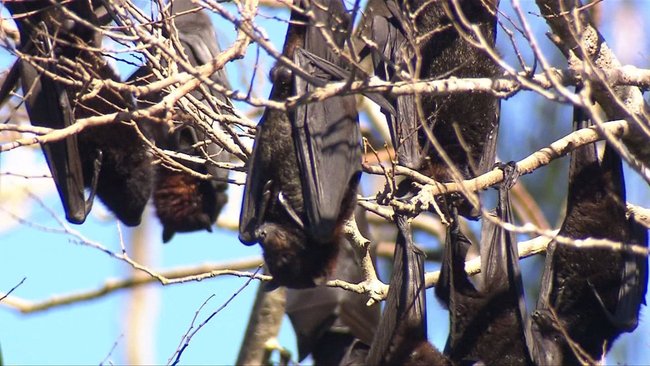A Queensland council has been forced to consider a new property buyback scheme due to noise and health issues from an unlikely source, which are feared to have reduced property values to “basically zero”.
Gympie Regional Council are now considering drastic measures to alleviate residents sick of dealing with a large and disruptive flying fox population, and are calling on the state and federal government for help.
Residents neighbouring Commissioners Gully in Gympie said the native bats have been growing in number over the past four years.
Know the news with the 7NEWS app: Download today
Christopher Nevin said he and his partner bought knowing there were bats in the area, however, the bats have begun to cause more issues in recent times due to their numbers.
“It’s mostly just noise and droppings that are the biggest issue,” he said.
“We’ve had three dead bats (in the yard) that have we’ve had to scoop up and throw in the bin.”
Nevin said he was worried about potential health issues, and has also suffered damage to his house and fence from fallen branches caused by the bats.

He said he would like to see council “bulldoze the dead trees” and “reclaim the area” by building a park in the area instead.
Gympie Mayor Glen Hartwig said state and federal government should be pulling out their “chequebook” to assist people impacted by the bats and has publically backed a potential buyback scheme.
“It’s a problem we’ve been dealing with for a number of years, we’re looking to advocate state and federal government to change legislation so that the residents there will no longer continue to suffer,” he said.
“The residents were there first and the bats have moved in, and they’ve created a circumstance for them where their mental health is suffering, their properties have been devalued to basically zero and the opportunity to move these bats on is restricted significantly by the legislations in place.”
Hartwig said higher forms of government have “created the circumstances” and should be ready to “compensate these people by buying out the properties or assisting council in moving (the bats) on”.

“State and federal governments need to come to the party with a chequebook and assist these residents, they moved there decades ago, before the bats,” he said.
“Their lives have been significant impacted…their lives are more important than the bats.”
Flying foxes are protected under the Nature Conservation Act in Queensland and are also protected at a federal level.
Some species, including the grey-headed Flying-fox, are listed as vulnerable.
Conservation groups say flying foxes are vital for the health of native forests, and act as crucial pollinators and seed dispersers.
Nevin said the buyback scheme would only work if they were offered a reasonable sum of money.
“We have a mortgage, it would only be ok if we could pay off the entire mortgage and set ourselves up for a new place, because if we are financially worse off that would be horrible.”
Councils are allowed to manage flying fox numbers in urban areas by trimming tree branches, and other non-lethal deterrents such as sprinklers.





